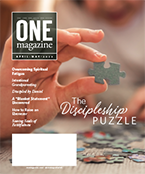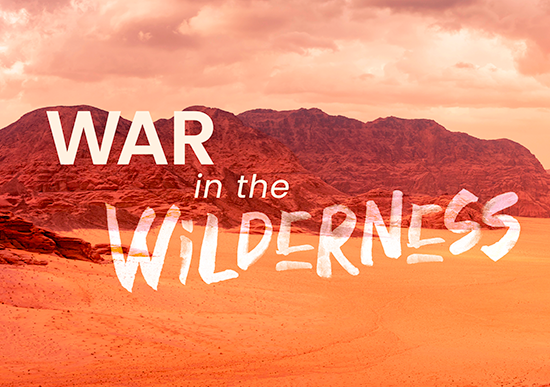
April-May 2023
The Discipleship Puzzle
------------------
|





War in the Wilderness
By Brian Haynes
We can’t even imagine how good life was for the first humans. The man and the woman were placed by God in a garden called Eden, literally meaning “paradise.” Everything needed for life flowed perfectly from Eden. Perfect paradise and perfect peace. This first garden was life as it was designed to be lived.
Scripture describes another garden, a garden of shalom. This garden is in our future. We aren’t there yet, but we cling to its promise. In the book of Revelation, John described a vision of the future given to him by Jesus. After generations of life in the wilderness, a new day, the Great Day, is accompanied by a second garden with similarities to Eden, only this one is called Yeru Shalayim or “City of Peace.” The New Jerusalem is a perfect city of perfect peace. There, life finally will be as it should be.
Between those two gardens, Eden (Paradise) and New Jerusalem (Peace), there is only the desert, a biblical metaphor for life and the place we are loving and leading our families, spouses, children, and grandchildren. Here, life is not as it should be. We wait between two gardens. We are at war in the wilderness, this desert called life.
The Hebrew language uses three primary words to describe the desert: midbar, t’siyah, and yashiymown. These words represent three types of deserts, and metaphorically, three types of life-experience most of us navigate during our time walking the planet.
The first desert, and perhaps the most livable, is midbar. While midbar can be treacherous if you are inexperienced or lack guidance, you can live there if you know what you are doing. As it compares to life, midbar is basically what we call normal. No, it is not exactly right. It is not as it should be. But, it is about as good as it gets outside the garden of Eden. In a midbar, there is sickness and sin. There is pain. Evil exists. Consequences are real, and you must work to make it, but you can survive the midbar.
The second type of wilderness is t’siyah. You can survive this desert, but only if you have help. This is deeper, darker, hotter, and even more chaotic. You need help to trek this part of life and survive. Here, you encounter moments and seasons full of drought and deep darkness—those times in life when the soul of your family is scorched. We walk this land in life. In the t’siyah parts of life, you can’t survive without help.
However, a third kind of desert awaits in life. Yashiymown is desert you cannot survive—wild, unbearable, and unfit for dwelling. During these moments in life, only the presence of God and a miracle of God will sustain you.
Life between the gardens is no walk in the park. While it’s all challenging, some parts are almost impossible. The most important action we can take to lead our families through this war in the wilderness is to cry out to God.
We hear these cries throughout the Word of God. And, when God’s people cry out to Him, He always hears, just like you hear the cry of your own child. He will hear you, too, no matter what desert you face.
Adapted from War in the Wilderness: Fight for Your Family When Life Isn’t as It Should Be by Brian Haynes. Read the book to learn about Brian’s journey through Yashiymown, and how God protected and preserved Brian and his family.
About the Author: Brian Haynes serves as Lead Pastor at Bay Area First Baptist Church. He is a graduate of Baylor University, Southwestern Baptist Theological Seminary, and Liberty Baptist Theological Seminary, where he earned a D.Min. in discipleship and family ministry. Order your copy today: warinthewilderness.com.
|
|

